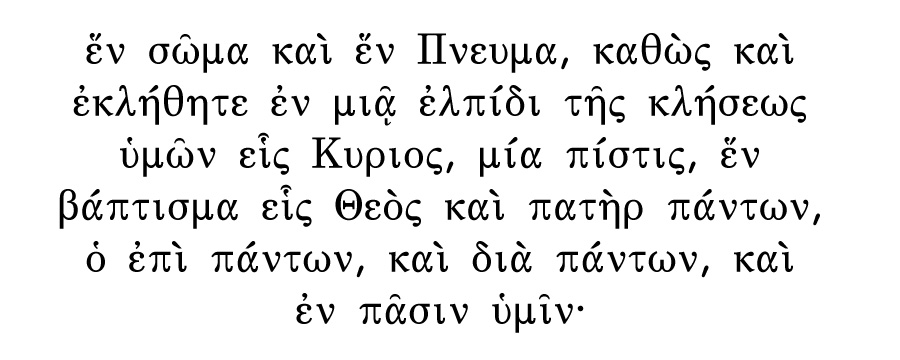
Itís All Greek to Me
by David M. McNabb

Are you able to read the preceding paragraph? If not, then certain Bible "scholars" would tell you that you are not capable of truly understanding the word of God.
One of the interlinear Greek-English New Testaments prefaces the text with a list of reasons that the Hebrew and Greek are valuable to clergymen. In this list, we are told, "Without some knowledge of Hebrew and Greek, you cannot be certain, in a single instance, that in your sermon based on a Scripture text, you are presenting the correct teaching of that text." And again, "Without some knowledge of Hebrew and Greek, you cannot be an independent student, or a reliable interpreter of the word of God."
For those of you whose English is shaky, these "scholars" are saying that if you donít know Hebrew and Greek, at least somewhat, you cannot accurately preach, or even study, the word of God.
When I was still in high school, I had an acquaintance of another faith. This fellow student informed me that, in their religion, their holy book must be read (chanted) in a particular language. My response to this was amazement. Even then, I felt that it was quite a discredit to the Creator of the universe to limit Him to being more or less monolingual.
This same Creator had created all of the languages, and I, therefore, am confident that He also masters their use.
The fact that the church of the first century primarily used a tongue other than the one used by the Old Testament patriarchs only strengthens the idea that God can, and will use vernaculars other than Hebrew (or Greek).
The Psalmist said, "The heavens declare the glory of God; and the firmament showeth his handywork. Day unto day uttereth speech, and night unto night showeth knowledge. There is no speech nor language, where their voice is not heard." (Psa. 19:1-3) Are we to believe that Godís creation can get its point across in any language, when He Himself cannot?
Paul believed that there was more to understanding the word of God than merely reading it in "the original Greek or Hebrew." He said, "Now we have received, Ö the spirit which is of God; that we might know the things that are freely given to us of God. Which things also we speak, not in the words which manís wisdom teacheth, but which the Holy Ghost teacheth; comparing spiritual things with spiritual. But the natural man receiveth not the things of the Spirit of God: for they are foolishness unto him: neither can he know them, because they are spiritually discerned." (1 Cor. 2:12-14)
When King David uttered his last words, in 2 Samuel chapter 23, he began by saying, "The Spirit of the Lord spake by me, and his word was in my tongue." God spoke to David in Davidís own language, and God never changes.
God promised to preserve His word. That isnít limited to preserving it in the language of original authorship, but preserving it through the translation process as well. We must believe that we have access to His infallible word in our own language, and that, no matter what language Godís word is in, it is only by the Holy Ghost that we can understand it.
As to the statement often used by these pseudo-scholars, "The original Greek says...," Gail Riplinger offers a well-put response in her book New Age Bible Versions. "So which Greek? Aleph1, Aleph2, Aleph3, B1, B2, B3, C, L, W, Textus Receptus, Wescott and Hort, Scrivenerís, Alfred, Griesbach, Elzevir, Erasmus, Tischendorf, Lachman, Souter, von Soden, Hodge-Farstad, Nestleís-Aland, (If so which edition between 1 and 26?, which printing of the 26th?) UBS-Aland, Black, Metzger, Wikgren (Which edition between 1 and 4?) or the Greek-English Diglot for the Use of Translators. A complete list of manuscripts and critical texts will bury the boaster in words, with the epitaph, ĎItís Greek to meÖí"
The truth is, all of these various Greek texts differ from the rest. We have a couple of interlinears ourselves, both based on the Textus Receptus, and even they differ from each other, if only slightly.
The English text which we use exclusively is the King Jamesí Version, translated from the Textus Receptus, and represents the earliest, broadest (numerically and geographically) and most consistent edition of the N.T. On the other hand, the new versions, taken from the Nestleís-Aland type eclectic text, use later readings, representing a narrow "fraction of 1%" of the extant manuscripts, from one locale. This fact alone makes the KJV the most reliable text available to us in English.
Regardless of the propaganda (leaven) of todayís "scribes," no matter in which language you are reading the Holy Scriptures, it is only by inspiration of the Holy Spirit that your understanding will be fruitful.
I, personally, am quite adept at learning and speaking other languages. I know Russian and French, some Spanish and Ukrainian, and tidbits of many other languages (including enough Greek to at least attempt to read the words in my interlinear Bible). I understand the intrinsic value of learning at least one foreign language. Nonetheless, I know that our God has seen fit to hide the meaning of His word from the wise and prudent and reveal it unto babes. (Matt. 11:25)
Let us, then, be not as the learned scribes, lawyers, Pharisees, Saducees and philosophers, but as little children, for only then may we enter into the kingdom of heaven.